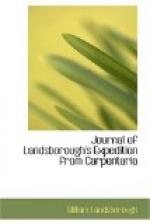of river. At 11.37 made half a mile west along
the river to a point where an isolated hill bore west-south-west
and by south. At 11.43 made quarter of a mile
west and watered our horses at the river. Started
again at 12 noon. At 12.20 steered one mile west,
overtook our companions, and halted to water the horses
of the main party. Started at 1 p.m., and at 1.50
made two miles south-west by following up the river.
At 2.24 made a mile and a quarter south-west by west
through a pass confined by hills on the right and the
river on the left. As soon as we got out of it
we observed similar ones on the opposite side of the
river. At 2.45 made three-quarters of a mile
south-west by south to a point where we made our Number
10 camp. Today we went up the river twelve miles
and a half. During that space it is confined
more or less by ranges, which the river on either one
side or the other washes the base of when it is flooded.
The troopers agree with me in thinking that the river
has the appearance of having a constant stream of
water. A small log of wood on the edge of the
water I observed was covered over with a stony substance
formed by sediment from the water. At one place
in the river where we bathed the current was so strong
that it took our feet from under us in wading across.
It is so deep that it is not fordable except at the
bars between the waterholes, where it runs rapid.
Its bed is full of large trees, among which I observed
gum, Leichhardt, tea, and cabbage-palm-trees.
Along the edge of the water it has a fringe of pandanus.
Among the trees in the second bed by the river there
is coarse grass and other herbs. If we had seen
the country under more favourable circumstances, a
short time after rain had fallen instead of now, when
the grass is dry and withered, I should have called
it most beautiful country; for, with the exception
of a few barren ranges the soil is very rich and clothed
with the best of grasses. The trees upon it are
chiefly bauhinia, and stunted box and gumtrees, without
ironbark.
Wednesday November 27. Camp Number 10, situated
on the banks of the Gregory River.
Ginger, the old black horse, was missing until eleven
o’clock, when the troopers reported that they
had found him in the river drowned, and floating down
with the stream. I had the horses brought down
on the previous evening to the only watering-place
which was safe, but as they were watered a few hours
before they did not all of them drink so soon again.
From camp we crossed a bad gully and from it made a
fair start at 11.52, having made at that place half
a mile south-west by south. The river is at this
place closely confined on both sides by stony ranges;
a few drops of rain fell on us in that pass.
At 12.40 p.m. made two miles west to a small dry watercourse
from the north, which is full of pandanus at its mouth.
The ranges on the left bank had on them dykes like
artificial ones, which run at different places across
the hills. At 1 p.m. we made three-quarters of




